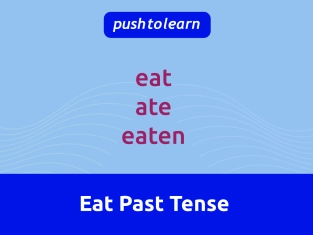by PushtoLearn
Grind Past Tense
Table of Contents
Grind Past Forms - Exercises
These exercises test different forms of the verb GRIND and IRREGULAR VERBS
Meaning of Grind
The verb "grind" means to break something into smaller particles, usually by crushing, rubbing, or cutting, or to work hard on something persistently.
Example:
-
"I grind coffee beans every morning for a fresh cup of coffee."
-
"She grinds her teeth when she’s stressed."
When referring to past actions, "grind" changes to "ground."

Forms of "Grind"
|
Tense |
Form |
Example Sentence |
|
Present |
grind |
"They grind spices to add flavor to their dishes." |
|
Past |
ground |
"Yesterday, he ground some wheat to make flour." |
|
Past Participle |
ground |
"She has ground the coffee beans to perfection." |
|
Present Participle |
grinding |
"The workers are grinding metal to shape it." |
Examples of "Grind" in Sentences
Past Tense (ground):
-
"The chef ground fresh pepper onto the dish before serving."
-
"She ground her teeth during the meeting because of anxiety."
-
"I ground the herbs into a fine powder for the recipe."
Past Participle (ground):
-
"He has ground the spices to a fine consistency."
-
"They had ground the wheat before the mill broke."
-
"The artist has ground pigments to create vibrant colors."
Common Mistakes with "Grind"
1. Using "grinded" instead of "ground":
A common error is forming the past tense or past participle as "grinded," which is incorrect. The correct form is always "ground."
-
Incorrect: "She grinded the coffee beans this morning."
-
Correct: "She ground the coffee beans this morning."
-
Incorrect: "The machine has grinded the metal parts."
-
Correct: "The machine has ground the metal parts."
2. Forgetting the figurative meaning of "grind":
"Grind" can be used figuratively to mean working hard or persevering through a difficult task. Learners might not recognize this usage.
-
Correct: "He ground through hours of studying for the exam." (worked persistently)
-
Correct: "They ground out a victory in the final minutes of the game." (achieved through effort)
3. Confusing "ground" with "grind" in ongoing actions:
Learners may incorrectly use "ground" instead of "grinding" for present continuous actions.
-
Incorrect: "I am ground the spices for the curry."
-
Correct: "I am grinding the spices for the curry."
4. Using "grind" instead of "crush" or "blend" in certain contexts:
"Grind" is often used for breaking something into fine particles, but learners sometimes use it when "crush" or "blend"would be more accurate.
-
Incorrect: "I grind the garlic for the sauce."
-
Correct: "I crush the garlic for the sauce."
-
Incorrect: "She ground the fruits to make juice."
-
Correct: "She blended the fruits to make juice."
Irregular verbs are important in learning the Past Simple. Do some extra Grammar Exercises A1. Don’t forget verbs like Shine, Ski, and Hear as you go.
FAQ
What is the past tense of "grind"?
The past tense of "grind" is "ground."
How do I use "ground" in a sentence?
Use "ground" to describe grinding actions that happened in the past.
Example: "I ground some coffee beans for breakfast."
What is the past participle of "grind"?
The past participle of "grind" is also "ground."
Example: "She has ground the spices to a fine powder."
Is "grinded" correct?
No, "grinded" is not correct. Always use "ground" for the past tense and past participle.
Can "grind" be used figuratively?
Yes! Example: "He ground through the difficult task," meaning he worked hard to complete it.

